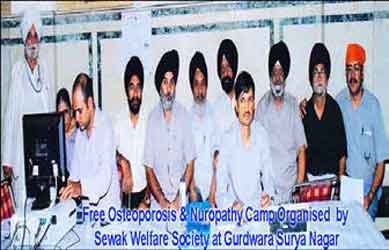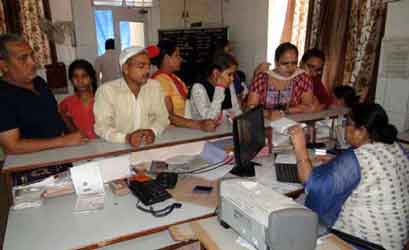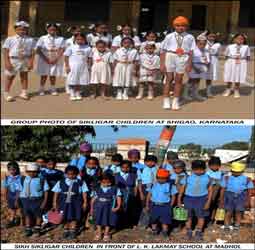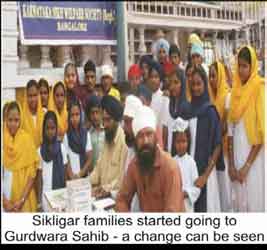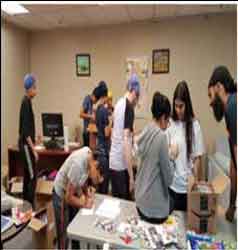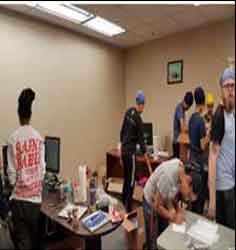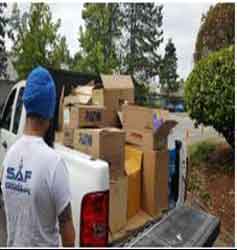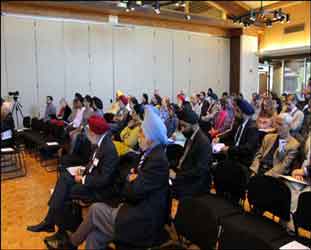Pracharaks were regularly taken with them so that greater impression is cast on these Sikligars and they discover their Sikh roots quickly. From time to time, oral tests were conducted among children and those giving correct answers were given encouragement besides cash and other prizes. After Dadri, children at Chirori [Loni] were also adopted for education and the Dadri pattern was replicated. This went on for about 2 years. All the work was now supported by Jagdish Singh Bhatia, President Gurdwara Sri Guru Singh Sabha Surya Nagar [Ghaziabad] who inspired his other members to support this noble cause wholeheartedly and spread the message amongst the sangat appreciably. The contact details of the organization are – Address is A89 2ND FLOOR YOJNA VIHAR DELHI110092 and contact number is 9350536219
Nishkam Sikh Welfare Council
When, in the year 1984, genocide against the Sikhs had taken place in Delhi and other parts of the country, some Sikhs thought of helping the affected persons, the helpless widows, orphans and destitute. They started their efforts from the worst affected area of Mangolpuri and Sultanpuri in Delhi with the aid from relief funds of Indian Express and Ajeet Jalandhar. This group of dedicated workers gave birth to an organisation called Nishkam Sikh Welfare Council. They helped the victims in all respects by providing them relief and rehabilitation by making their houses starting their earning sources, getting admission for their children into schools and enabling them to get the financial help from which ever source they could procure them. When the widows affected by this genocide were allotted houses in Tilak Vihar, a small Dispensary was started in a rented room, which later developed into a full-fledged Polyclinic-cum-Diagnostic Centre Equipped with 500mA-X-Ray machine and Auto Analyser with Modern Dental Unit. Recently two operation theatreshave been added.
As the time passed, this organisation strengthened itself both in resources and activities. In 1998, they started Nishkam Scholarship – Talent Search and Sport Programme for helping the needy and talented students, irrespective of their cast and religion. This programme was started with the cooperation of relief committee of Greater New York, USA. In the year 2002 Sikh Human Development Foundation, USA (SHDF) extended the helping hand by providing Scholarship for the technical education. Since then scholarship have been provided to thousands of students. The organisation has also been doing a wonderful job in the sphere of medical aid to the poor and the needy patient. Till date they have helped 50 major medical cases which included the case of baby Sukhmani suffering from cranio-facial disorder for which more than 20 lakh rupees have been mobilize and spent. They have also started an old age home and orphanage under the name of Mata Gujari Sukh Niwas at Kharar, which is functioning for the last 20 years under the management of a committee constituted from the Nishkam Sewadars of Chandigarh and Kharar. The Nishkam Sewadars of the organisation include the workers who are comprised of medical practioners, educationists, IT professionals, Chartered Accountants, self employed professionals, businessman and even serving and retired bureaucrats. This esteemed organisation has also done commendable work as a part of disaster management. Weather it was an earthquake in Uttarkashi in October 1991 or an earthquake in Gujarat in 2001, they extended the help to the affected people. Similarly, in 2005 they extended help and cooperation to the people affected by Tsunami. They constructed 47 houses and one community centre under the banner of Guru Nanak Sarbat Sikh Sangat.
The service rendered by the Nishkam Sewadars in the field of Sikh religion are also laudable. Their prestigious project in this regard relates to the Social rehabilitation and Educational upliftment for those sikligar families living in unhygienic and miserable position in jhugis with likeminded volunteers from Bangalore. In 2001, they started the construction and completed 23 houses in record time, It is pertinent to note that with the infusion of spirit of Chardikala these hard working honest people have started making repayment, 23 beneficiaries have started repaying the @ Rs. 125 per week. Next phase of construction of 109 more houses is in hand, through government agencies. For thus, Nishkam has made advance payment. In the family, where nobody was even 5th pass, now the children are preparing for 11th class onward. Approximately 350 are being provided proper education. In 2005, we started construction of 33 houses for Sikligar families, living in jhuggis at Udaipur (Rajasthan). They are being helped by the Karnataka Sikh Welfare Society for day-to-day management o the Karnataka Project and All India Sikh Welfare Society for taking care of the construction work at Udaipur.
Nishkam Sikh Welfare Organisation, Canada
Nishkam, Canada was formed by a group of individuals for the purpose of charity for weaker sections of the community. As their focus is on Sikligars, they have tied with certain NGOs in India for execution for their projects and plans. The people working with Nishkam Canada do not get any salary, rather, spend some amount from their pockets on the planned projects. Whatever donations are received the same are also spent on such projects. Their objectives are:
- Assist impoverished communities and families in moving out from temporary shelters into proper housing facilities.
- Provide educational scholarships for the impoverished but deserving students in India.
- Support inmates of old age homes and orphanages in India by providing basic amenities.
- Support, develop, design programs to motivate and retrain teachers, enhance and improve the learning experience in the classroom and add new facilities in the existing schools e.g., provide drinking water, blackboards and toilets where required.
The organisation came into existence in March 2005 as registered Canadian Charity
(BN863589651RR0001), with the Canada Customs and Revenue Agency (CCRA). The main two charitable
projects of this organisation are targeted at the Sikligar Sikh community of Karnataka. These Sikligars along
with Vanjaras and Lubanas have been residing in abysmal condition in huts and shanty town of Karnataka,
Andhra Pradesh, Madhya Pradesh, and Rajasthan. They were converted to Sikhism at the time of Sikh
Gurus when some specific duties like making weapons were given to them. They are very hard working and
industrious, but have no opportunity to come out of poverty. Many of them are not even aware of the fact
that their religious roots are in Sikhism. So the first project is to educate them to bring them into the main
stream and also provide them with knowledge of Sikhism. This project is aimed at providing school supplies,
books, uniforms, shoes etc. to the 351 school going children of the Sikligar Sikh community in Karnataka.
AS part of this project Nishkam Canada is also assisting with the hiring of after school tuition teachers so that
the children that cannot be assisted by their illiterate parents with homework, have other support available
to them.
